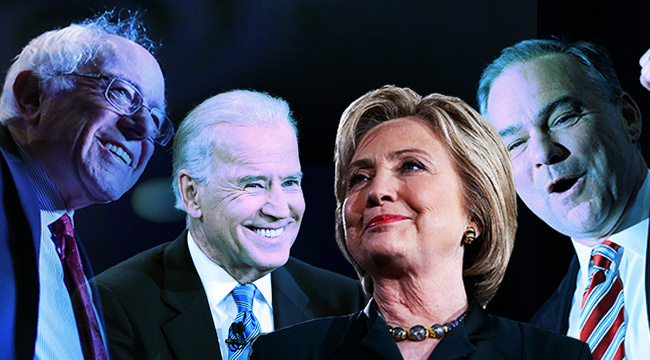
The Democratic Party, much like the Republican Party, makes its nominations ironclad. Once you’ve got the nod, you hold it until you win, lose, or drop out of the race. While it’s unlikely that Hillary is leaving the Presidential race, her recent announcement of a pneumonia diagnosis has some wondering what happens next. How much of an issue will this be?
First of all, it should be noted that Hillary would hardly be the first candidate with health problems who’s running for, or even holding, the office of President. FDR famously had polio. JFK went to enormous lengths to disguise his health issues. George W. Bush talked openly about his struggles with alcoholism. George H.W. Bush infamously vomited on the Prime Minister of Japan before passing out.
Nor is concern, or rumors, over a candidate’s health anything new. Both Obama and John McCain dealt with it in the 2008 election; Obama famously had to quit smoking right before his campaign started, and McCain released 1,100 pages of medical records to address concerns that his time in a Vietnamese POW camp, which left him unable to lift his arms above his shoulders, had damaged his health. So, Clinton is in good company.
It’s unlikely Clinton will be replaced. But if she is, who will do the replacing?
Who Picks The New Candidate?
Unlike the RNC, which essentially requires holding a convention all over again, the DNC’s bylaws make it clear, in Article 2, Section 1, that, if there’s a vacancy in the Presidential nomination, the Democratic National Committee fills it unilaterally. Unfortunately, they have a short list of candidates to fill that slot.
But that reality isn’t all bad. The upside is that there won’t be much of a delay in selecting a candidate, unlike with the GOP. If Trump resigned tomorrow, Republicans could very credibly wind up going into the election without an official candidate. The downside is that the Democratic replacement process would open the door to quite a bit of squabbling in a party that already endured a fractious, messy summer, not least because no matter who takes over, somebody is going to be unhappy.
Who Would Take Over?
While Presidential candidates rarely abandon their nominations, it does happen in other offices, and in many cases, tradition holds that the spouse steps in for the candidate. When Mel Carnahan, campaigning for a senatorial seat in Missouri, died in a plane crash, his wife Jean stepped in and was appointed. But Bill Clinton is off the table, having served two terms. In theory, Chelsea Clinton could step in, although she seems to have little interest in political office, having focused much of her career on philanthropy and public health.
Bernie Sanders would seem to be credible (and many who Felt the Bern still hold a candle to him), but the Sanders campaign spent much of the summer struggling to show it was a professional operation. His camp mishandled a disaster at Nevada’s Democratic convention and tried, largely in vain, to keep his supporters civil during the national convention in Philadelphia. Even before that, Sanders was heavily critical of the DNC, which is something that many in the organization took personally. In short, Sanders and the DNC have little reason to trust each other, so it’s unlikely he’ll be asked to take over.
In the end it really comes down to two Vice Presidents. Tim Kaine is the obvious choice and could easily take over Hillary’s campaign. Or the DNC could ask Joe Biden to step in if Kaine doesn’t feel ready, although Biden has made it clear more than once he has little interest in the top job.
The second problem is logistical. Ballots are generally printed a month before the election and shipped, so in order for whoever the DNC chooses to be on the ballot in the first place, they have to be chosen by that deadline. If not, that could potentially be a problem.

